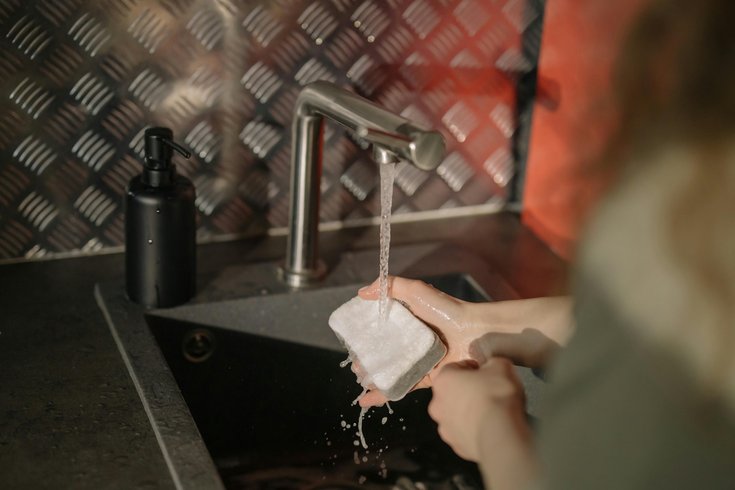
April 03, 2024
 cottonbro studio/Pexels
cottonbro studio/Pexels
Because they harbor hundreds of bacteria, kitchen sponges should be frequently sanitized and replaced on a regular basis, health experts say.
You may cringe each time you wring out your dirty, old kitchen sponge, thinking you should replace it. And often, you then forget. But you really should swap it out for a new one – and probably more often than you might think.
At least once a week is the minimum that some health experts generally recommend for replacing sponges. Other recommendations call for cleaning your sponge between each use – even for using a new sponge each day.
Here's why: Sponges provide the perfect environment for bacteria growth because the smaller chambers appeal to microbes that prefer secluded spaces, and the larger wells cater to bacteria that need each other to survive, according to a 2022 study published in the journal Nature Chemical Biology. These researchers recommended people regularly replace sponges and find ways of sanitizing them in between.
Researchers from a 2017 study found kitchen sponges to be among the most dirty household items, right there with door knobs and toilets. They discovered more than 360 kinds of bacteria – even E. coli and Salmonella – on kitchen sponges, concluding that people should replace them once a week.
Another study in 2022 determined that it didn’t really matter how people cleaned their sponges or how often. The researchers concluded that kitchen sponges harbored more bacteria than kitchen brushes because the brushes dried out more quickly.
Experts at the University of Rochester Medical Center even recommend tossing out sponges altogether. Instead, they suggest using a clean dishcloth every day, wringing it out and drying it after each use, and then running it through the washing machine.
If you still can't part with your sponge, a comparison from 2017 concluded that polyurethane sponges had "several advantages over use of cellulose sponges in reducing exposure to enteric bacteria in the kitchen." But sometimes it's hard to distinguish between the two when shopping for sponges online, because not all brands list their contents.
However, Jennifer Quinlan, a professor with Drexel University's Nutrition Sciences Department, told NPR after the much-cited 2017 study came out, that perhaps a more measured approach to sponge use was appropriate: keep sponges away from raw meat and poultry and using paper towels instead, frequently clean sponges, and replace them on a regular basis.
For those who want to hang onto their sponges, here are some sanitizing tips to keep them as bacteria-free as possible:
• Good Housekeeping recommends mixing 3/4 cup of bleach in one gallon of water. Soak the sponge in the mixture for five minutes, then rinse. The magazine also suggests zapping your sponge in the microwave. Make sure it's saturated with water, then heat it on high for one minute. Remember not to put sponges containing metal in the microwave.
• Marthasterwart.com says to fully submerge and soak your sponge in a bowl of white vinegar for 5 to 7 minutes. Then rinse it in hot water, wring it out and let it air dry.
• Forbes explains that you can put a sponge in 2 cups of boiling water for five minutes. Let it cool in the water, and then wring it out and let it air dry.
• Better Housekeeping says to place your sponge in the top rack of the dishwasher, running it on the hottest, most-extended cycle available.